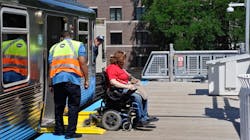Bicameral legislation introduced to make transit more accessible ASAP
Legislation has been introduced in both the U.S. House of Representatives and Senate aimed at making stations on transit and passenger rail systems more accessible.
The All Stations Accessibility Program (ASAP) Act of 2021 is being introduced by two Illinois Democrats in the House, U.S. Reps. Marie Newman (IL-03) and Jesús “Chuy” García (IL-04), while the Senate bill has been introduced by Sens. Tammy Duckworth (D-IL), Sherrod Brown (D-OH) and Bob Casey (D-PA).
The proposal in the bill would establish a discretionary grant program that would appropriate $10 billion over 10 years to support local transit authority and commuter rail efforts to upgrade existing stations to meet or exceed accessibility standards under the Americans with Disabilities Act (ADA), which was signed into law more than 30 years ago.
“Public transportation systems should be accessible to all Americans, especially those protected by the Americans with Disabilities Act. Thirty years later and we still have a long way to go,” said Rep. García.
According to data within the National Transit Database, more than 1,000 transit stations out of a total of 5,645 stations were not ADA accessible in 2019, the most recent year full data is available. While the total number of ADA accessible stations increased by more than 500 between 2018 and 2019, the data suggests new stations account for most of that increase rather than existing stations undergoing ADA-related improvements. The total number of stations increased by 483 between 2018 and 2019. The number of non-ADA accessible stations decreased by 21.
Sen. Brown added, “There’s no reason that 100 percent of our transit systems shouldn’t meet or exceed ADA standards.”
“Building world-class, equitable public transportation starts by ensuring every station, bus and train across our nation is equally accessible to everyone,” said Rep. Newman. “In cities across the country, public transit represents the great connector to jobs, housing, education and opportunity, but this great public service falls short of its promise when it is not accessible to all Americans.”
Sen. Duckworth met virtually with Federal Transit Administration Deputy Administrator and Nominee Administrator Nuria Fernandez on May 18, where she says she discussed the ASAP Act and secured Deputy Administrator Fernandez’s support to work on improved transportation accessibility.
“To truly ‘Build Back Better,’ it’s imperative that the federal government prioritizes transit and commuter rail accessibility so that every American can use our nation’s public transportation systems,” Sen. Duckworth said. “I was glad to secure Deputy Administrator Nuria Fernandez’s commitment to work with me to improve public transportation accessibility and create good-paying jobs in the process.”
Sen. Casey added the legislation would deliver more accessible transit systems and give “people with disabilities more opportunities to fully participate in their communities.”

Mischa Wanek-Libman | Group Editorial Director
Mischa Wanek-Libman is director of communications with Transdev North America. She has more than 20 years of experience working in the transportation industry covering construction projects, engineering challenges, transit and rail operations and best practices.
Wanek-Libman has held top editorial positions at freight rail and public transportation business-to-business publications including as editor-in-chief and editorial director of Mass Transit from 2018-2024. She has been recognized for editorial excellence through her individual work, as well as for collaborative content.
She is an active member of the American Public Transportation Association's Marketing and Communications Committee and served 14 years as a Board Observer on the National Railroad Construction and Maintenance Association (NRC) Board of Directors.
She is a graduate of Drake University in Des Moines, Iowa, where she earned a Bachelor of Arts degree in Journalism and Mass Communication.


